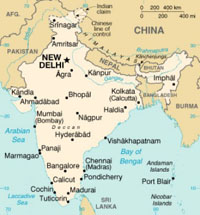Pakistan, India vow to import Iranian gas, but fail to reach deal on pricing formula
The decision was announced by energy officials from Pakistan, India and Iran at the end of two-day talks in the capital, Islamabad.

The United States has long opposed the US$7 billion (Ђ5.8 billion) gas pipeline because of its differences with Tehran over its nuclear program.
It has also urged Pakistan and India to avoid the project to put pressure on Iran to abandon its nuclear program, which Tehran says is for peaceful purposes.
On Tuesday, Iran's deputy Petroleum M.H. Nejad Hosseinian, Indian secretary for Petroleum Ministry, M.S. Srinivasan and his Pakistani counterpart Ahmad Waqar told a news conference that the project was good for each country.
The talks came the day Josette Sheeran Shiner, U.S. Undersecretary for Economics, Business and Agriculture Affairs met with Pakistani Prime Minister Shaukat Aziz urged Islamabad to consider reopening of road links and importing gas from Central Asian states who had surplus energy.
However, she would not comment on whether she had discussed the Pakistan-Iran-India pipeline project with Aziz. Shirner also avoided questions about U.S. pressure on Pakistan over the pipeline.
Waqar said Pakistan was pursuing the project because it needed the gas to meet its fast growing energy needs, while Hosseinian expressed his optimism by saying "we will implement the project trilaterally."
He said the gas to Pakistan would be delivered at the Pakistan-Iran border, while India will get it from the Pakistan-India border. Although Waqar said they had failed to reach any agreement with Iran on a pricing formula, he hoped that it would also be resolved in July when they would meet in New Delhi.
India and Pakistan share a history of hostile relations.
Subscribe to Pravda.Ru Telegram channel, Facebook, RSS!


